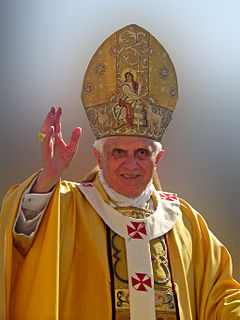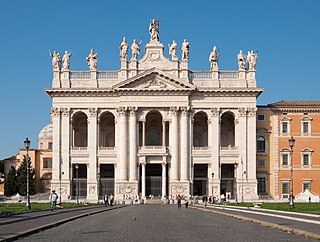
Pope Benedict XVI is a retired prelate of the Catholic church who served as the head of the church and the sovereign of the Vatican city state from 2005 until his resignation in 2013. Benedict's election as pope occurred in the 2005 papal conclave that followed the death of Pope John Paul II. Benedict chose to be known by the title "pope emeritus" upon his resignation.

Biblical inspiration is the doctrine in Christian theology that the human writers and canonizers of the Bible were led by God with the result that their writings may be designated in some sense the *word of God. This belief is traditionally associated with concepts of the biblical infallibility and the internal consistency of the Bible.

The theology of Pope Benedict XVI, as promulgated during his pontificate, consists mainly of three encyclical letters on love (2005), hope (2007), and "charity in truth" (2009), as well as apostolic documents and various speeches and interviews. Benedict's theology underwent developments over the years, many of which were characterized by his leadership position in the Congregation for the Doctrine of the Faith, which is entrusted with preserving the Catholic faith in its entirety.

The personal papal coat of arms of Pope Benedict XVI was designed by Archbishop Andrea Cordero Lanza di Montezemolo soon after the papal election in 2005.

Deus caritas est, subtitled De Christiano Amore, is a 2005 encyclical, the first written by Pope Benedict XVI, in large part derived from writings by his late predecessor, Pope John Paul II. Its subject is love, as seen from a Christian perspective, and God's place within all love. Charity is one of the three theological virtues; and the other two were treated in two successive encyclicals, one signed by Benedict and one written substantially by him but signed by his successor Pope Francis . This text begins with a reflection on the forms of love known in Greek philosophy—eros, agape, philia (friendship)—and their relationship with the teachings of Jesus.

Joseph Ratzinger was named by Pope John Paul II on 25 November 1981 as prefect of the Congregation for the Doctrine of the Faith, formerly known as the Holy Office and, especially around the 16th century, as the Roman Inquisition.

The Regensburg lecture or Regensburg address was delivered on 12 September 2006 by Pope Benedict XVI at the University of Regensburg in Germany, which sparked international reactions and controversy. The lecture entitled "Faith, Reason and the University – Memories and Reflections".

John Christopher "Aidan" Nichols is an English academic and Catholic priest.

Paul Francis Knitter is an American theologian. He is currently an emeritus professor at Union Theological Seminary, where he has served as the Paul Tillich Professor of Theology, World Religions and Culture since 2007. He is also Emeritus Professor of Theology at Xavier University in Cincinnati, where he taught for 28 years before moving to Union. Knitter is known for his work on religious pluralism and multiple religious belonging, particularly regarding Buddhism and Christianity.
"A Common Word between Us and You" is an open letter, dated 13 October 2007, from leaders of the Islamic religion to leaders of the Christian religion. It calls for peace between Muslims and Christians and tries to work for common ground and understanding between both religions, in line with the Qur'anic command: "Say: 'O People of the Scripture! come to a common word as between us and you: that we worship none but God" and the Biblical commandment to love God, and one's neighbour. In 2008 the initiative was awarded the "Eugen Biser Award", and the "Building Bridges Award" from the UK's Association of Muslim Social Scientists.
The option for the poor, or the preferential option for the poor, is one of the newer principles of the Catholic social teaching, as articulated in the latter half of the 20th century; it is also a theological emphasis in Methodism. The concept was first articulated within Latin American liberation theology, and was championed by many Latin American Christian democratic parties at the time.

The Pope Benedict XVI bibliography contains a list of works by Pope Benedict XVI.
Sensus fidei, also called sensus fidelium is, according to the Catechism of the Catholic Church, "the supernatural appreciation of faith on the part of the whole people, when, from the bishops to the last of the faithful, they manifest a universal consent in matters of faith and morals." Quoting the document Lumen gentium of the Second Vatican Council, the Catechism adds: "By this appreciation of the faith, aroused and sustained by the Spirit of truth, the People of God, guided by the sacred teaching authority,... receives... the faith, once for all delivered to the saints. ...The People unfailingly adheres to this faith, penetrates it more deeply with right judgment, and applies it more fully in daily life." The foundation of this can be found in Jesus' saying in Mt 16:18 that "the gates of Hell will not prevail against it," where "it" refers to the "Church", that is, the Lord's people that carries forward the living tradition of essential beliefs throughout history, with the Bishops overseeing that this tradition does not pursue the way of error.
Pope Benedict XVI, who led the Roman Catholic Church as Pope from 2005 to 2013, continued manouevring the Church through the dynamics of modernity, which the Church had begun engaging from the Second Vatican Council. The question of religious pluralism is a key issue raised by modernity, and so ecumenism, the establishment of harmony and dialogue between the different Christian denominations, is a significant concern of a post Second Vatican Council Church. Pope Benedict XVI's approach has been characterised as leaning conservative, while still never-the-less expansive and engaged, involving the full breadth of Christendom, including the Orthodox Churches and Protestant churches, as well as freshly engaging with other Christian bodies considered by Roman Catholics to be more heterodox, such as The Church of Jesus Christ of Latter-day Saints.

Gerhard Ludwig Müller is a German cardinal of the Catholic Church. He served as the Prefect of the Congregation for the Doctrine of the Faith (CDF) from his appointment by Pope Benedict XVI in 2012 until 2017. He was elevated to the rank of cardinal in 2014.

The Latin Church or the Western Church is the largest particular church sui iuris of the Catholic Church, and traditionally employs in the majority the Latin liturgical rites, which since the mid-twentieth century are very often in practice translated into the vernacular. The Latin Church is one of 24 such churches, the 23 others being referred to as a group as the Eastern Catholic Churches. The Latin Church is headed by the Bishop of Rome, the Pope—one of whose traditional titles in some eras and contexts has also been the Patriarch of the West, and whose cathedra as a bishop is located in the Archbasilica of Saint John Lateran in Rome, Italy.
Models of Contextual Theology is a book written by Stephen B. Bevans which argues that all Christian theology is contextual and identifies six dominant models of contextual theology.

Criticism of Protestantism covers critiques and questions raised about Protestantism, the Christian tradition which arose out of the Protestant Reformation. While critics praise Protestantism's Christ-centered and Bible-centered faith, Protestantism is faced with criticism mainly from the Catholic Church and some Eastern Orthodox Churches, although Protestant denominations have also engaged in self-critique and criticized one another.
Leslie Dewart was a Canadian philosopher and Professor Emeritus at the Graduate Department of Philosophy and the Centre for the Study of Religion at the University of Toronto.
Ludwig Weimer ( is a German theologian and priest of the Catholic Integrated Community.











